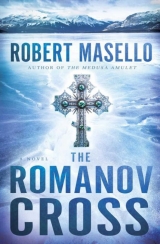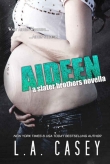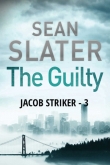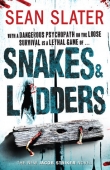
Текст книги "The Romanov Cross"
Автор книги: Robert Masello
сообщить о нарушении
Текущая страница: 3 (всего у книги 35 страниц)
Not that she needed the money.
Her new husband was a partner in a lobbying firm on K Street, and her own dermatology practice was going strong. He had seen ads for it in local magazines, and once or twice he had seen her interviewed on the local news about Botox and collagen. She had gotten what she wanted out of life … and he had got what he deserved. Or so he figured most people would see it.
When his lawyer came back to get him, he didn’t know how much time had passed. He had nodded off, and his cheek bore the impression of the cracks in the wood. At the front of the courtroom, all the judges were sitting stiffly in their chairs, but there was one thing different. In the back, on a plastic chair, was Dr. Lena Levinson, chief of the pathology institute, with a thick folder in her lap and a stern expression on her face. When he nodded in her direction, she glared back at him reproachfully, then answered a call on her cell phone.
“Will the defendant please stand?” the general said, and Slater stood up beside Lieutenant Bonham. He was surprised to find his knees a little weaker than he’d planned.
Clearing his throat, the general continued. “On the several charges brought by this court-martial against Dr. Frank James Slater, Major in the United States Army, the verdict of the court is as follows.” Slater braced himself, as did Bonham, who looked so pale it was all Slater could do not to put an arm around his shoulders.
“Guilty” was the one word Slater distinctly heard, over and over again. But then he had expected that.
It was the sentencing he dreaded.
And that, too, was going as badly as possible. He was stripped of his rank, then dismissed – dishonorably – from the Army. All pay, all allowances, and all benefits were forfeited, now and in perpetuity. It was only when the question of imprisonment came up that the general paused, while Slater waited with bated breath for the hammer to come down.
“On the subject of incarceration, which these charges normally carry, the court has heard outside counsel, and read an amicus curia brief submitted only hours ago.” His eyes flitted toward Dr. Levinson. “In view of Dr. Slater’s long and valuable service to this country, and in the national interest, the court has unanimously elected to forgo all such punishment at this time.”
No prison time? And in the national interest? Slater was stunned, and even Bonham looked confused.
The general read some summary remarks into the record – names, dates, articles of the military code adjudicated – then looked around the room, as if leaving time for any objections before saying, “This court-martial is hereby concluded.”
Slater – suddenly a civilian, even if a disgraced one, after thirteen years – could hardly believe his ears. Bonham was clapping him on the back, and even the general threw him a glance that was less condemnatory than rueful. On his way out, Slater found Dr. Levinson standing beside the door.
“I can only assume,” he said, “that your testimony here today had something to do with my reprieve?”
“It did.”
“Thank you,” he said, from the bottom of his heart. She was a tough old buzzard, but he knew that they had always understood, and appreciated, each other.
“And now we have to talk, Dr. Slater.”
“About the national interest?”
“As a matter of fact,” she said, “yes.”
Chapter 4
Harley Vane had become what you’d call a local celebrity. All the papers in Alaska, Oregon, and Washington State had carried his miraculous story of courage and survival, and he’d even received some national attention from an assortment of radio shows and a couple of TV stations.
At the hospital, where he’d recuperated for the first three days after his rescue, the nurses had treated him like a rock star, and Angie Dobbs had even come by to visit him. She said his drinks would be free at the Yardarm, and the way she said it made him think something else might be coming his way, too. At last.
This morning, the docs had promised him he’d be allowed to go if his numbers all checked out. Harley knew they would; he felt fine again, and he needed to see his brother Charlie. According to the nurses, Charlie had already come by, just a few hours after the Coast Guard cutter had picked him up, but Harley had been too disoriented to remember anything about it. There was a big blank spot in his memory, and there were plenty of times when he wished it were even bigger.
He remembered all too well barreling down the stairs to the hold. On the way down, he had pulled on a life vest, stuffed a flare in its pocket, then grabbed the emergency fire axe off the wall and stuck its handle in his belt. Water was gushing in from some unseen hole that had been ripped in the hull, somewhere beneath the holding tanks for the crabs. Thousands of them were suddenly loose again, scuttling up the walls, clinging to the ceiling, or paddling around on the rising tide. Old Man Richter was up to his knees in freezing water, trying to get the pumps working again.
“They won’t start!” he shouted. “They won’t start!”
“Get out!” Harley said. “Get out now!”
But Richter turned around and went back to work; he was the kind of guy, Harley knew, who would plan to go down with the ship.
Harley didn’t need that right now. He waded through the icy water, crabs nipping at his boots and thighs, and grabbed Richter by his bony shoulder. “I’m telling you to go on deck – now!”
“You shoulda let me get these serviced before we left port,” Richter said. “I told you they needed work!”
Another wave hit the ship broadside, and Richter tumbled into the water. His hand shot up, and Harley snatched it. He dragged the Old Man onto his feet again, but there were crabs all over him already, their pincers grasping at his wet clothes, or snapping furiously in the air. A big one, pink as bubblegum, was crawling up his chest, and Harley batted it off.
“Get out,” he screamed at the Old Man, “or I’ll drown you myself!” With a hard shove, he sent him toward the stairs. And then he sloshed through the debris to the coffin, still lashed to the conveyor belt. With fingers so cold they were almost numb, he fumbled at the ropes, but then gave up and chopped at them with the axe. The ropes and tarp fell away, and Harley took aim at the rusty hasps holding the lid closed. It took him several swings to knock each one loose, but when the last one went, he stuck the blade of the axe sideways into the groove and pried the lid up. It came up slowly, with a groan, and Harley had to push hard before it opened all the way and fell of its own momentum into the water. There was a splash, then the lid was bobbing like a surfboard around the hold.
The water was up to Harley’s thighs, and he was beginning to freeze. The lights flickered, but they stayed on. Inside the box he saw what looked like a mummy – a petrified face, all teeth and hair, grimacing with empty eye sockets, the hands folded to touch its own shoulders. Still, it was recognizably the corpse of a young man, maybe nineteen or twenty, and dressed in what looked like the frozen remains of a woolen tunic, with a rounded, Cossack-style collar, and black sealskin coat. But around the young man’s neck he saw what he had come for. It was one of those old Russian crosses, the ones with three sideways beams of different lengths, but embedded in it there were several old stones, glinting green in the dim light. He tried to pull it loose, but it was still on its chain. Much as he loathed the idea, there was nothing to do but reach down and lift the corpse’s head. Touching it felt like touching a bag of old shells and crumpled paper; the skin rustled and the skull weighed on his hand like an empty, fragile egg.
But the cross still wouldn’t come loose.
The chain was entangled in the boy’s long brown hair, and it was only after he had yanked at it several times, hard enough that the head was nearly severed from the spine, that it came up and over the crown.
He stuffed it deep into the inner compartment of his anorak, then zipped the pocket firmly closed. A couple of crabs had already clambered over the end of the coffin and spilled onto the corpse. Their claws were shredding the remains of the fabric and probing the hard flesh. One was worrying a toe and would have it loose in no time.
Let ’em have it, Harley thought, and the sooner the better. The water was still rising. It was up to his waist now, and the ship was so canted over that he could barely keep his balance as he reached for the stair railing. He hauled himself up, hand over hand, as the water surged behind him, and as something – hard and persistent – batted at his calves. Glancing back, he saw that the coffin lid, carved with the saint or angel or whatever it was, was floating up the stairs with him, like a faithful hound nipping at his heels.
On deck, everything was chaos. The howling wind was ripping at the lines and the pots, and the lifeboat had already been launched. Fuck you, too, Harley thought, looks like it’s every man for himself tonight. He wondered who had made it on board and who hadn’t. A flare went up from the water, and in its dead-white glow he saw the lifeboat, cradled between two mighty waves off the starboard side. The deckhands were trying to put some distance between themselves and the Neptune, lest they be sucked under when it sank. Harley thought he could make out Farrell at the tiller and Lucas clinging to the oarlocks, but over the wind blasting in his ears he heard a voice – Richter’s – shouting from somewhere down the deck.
The Old Man, in an orange life vest, was clinging to the mast.
Harley couldn’t hear a word he was saying – what could it matter? – but he saw him lift one arm and point out to sea, toward the looming black mass of St. Peter’s Island. It was big as a mountain now, and through the spray and the waves Harley could see the jutting rocks sticking up like spikes and barricades all around its shoreline.
Another flare rocketed into the sky, this one leaving a phosphorescent green trail, and in its light Harley saw the lifeboat spinning around and around in a whirlpool, before it suddenly broke free and was dashed against the rocks. The crew spilled out like jelly beans from a jar, and the splintered timbers of the boat flew in every direction. Before the green light had dissipated, Harley saw the bobbing vests of his deckhands caught in the eddies and the swirls, each one of them being sucked under and lost beneath the angry black tide.
As he looked up at the wheelhouse, a blue computer screen came crashing through a window, and the lights went black. The deck lurched under his feet, and he was sent sprawling into the crab pots. The cages were still full; when the boat went down with the cages still sealed, the captured crabs would have to eat each other until they died.
Harley’s mind was racing, wondering whether to stick with the wreckage of the boat or try making it to the crew cabin to retrieve a raft, when a wave crashed over the bulwarks on the port side and carried him, head over heels, into the ocean. He plunged in an instant into the icy water, the breath nearly knocked from his lungs, the salt stinging his blinded eyes. He was struggling to regain the surface, but the water was churning so hard, he couldn’t tell which way was up. He tried to stay calm enough to let the oxygen in his chest, and the air in his life vest, right him and send him upward again, but it didn’t seem to be working. He panicked and kicked out, pumping his arms. He collided with something, a rocky outcropping, and used it to push himself away. Gasping, he broke the surface of the water, and reaching out in the darkness, clutched something floating nearby. It was wood, and as he grappled it more tightly in his arms, he could feel its rough carvings. And he knew it was the coffin lid.
He managed to pull himself halfway on top of it, then wrapped his arms around its sides. The waves lifted him up and threw him down, over and over again, eventually pushing him through a narrow passageway between the jagged rocks, with the sea boiling all around him. He could barely see where he was going, and his arms were so numb he wondered how much longer he could hang on. But when he felt his knees scraping on the rocks and shells of the shoreline, he somehow managed to stagger to his feet, then struggle through the pounding surf until he reached the beach. There, he collapsed in a shivering heap, with the cross, still lodged in his pocket, poking him in the ribs.
The coffin lid, gleaming in the moonlight, skimmed to a stop on the pebbles and sand.
How long he lay there he didn’t know. Cold and hard as the ground was, it felt like a warm blanket compared to the icy sea. He took deep breaths, coughing out the salt water and the gravel that now clung to his lips, but he knew that if he lay there much longer, he’d die of exposure. Rolling onto his back, he gazed up at the night sky, where even behind the banks of angry, scudding clouds, he could see the dazzling pinpricks of the distant stars. Shaking himself from head to foot like a dog throwing off water, he sat up and stared out at the sea. There was no sign of the Neptune II, or any of the other crewmen. Even their flares had long since disappeared from the sky. Harley prayed that the Coast Guard was on its way.
Fumbling at the straps of the life vest, he yanked its straps off, then groped for the flare he’d stuck in its pocket. He didn’t want to use it too soon, but he didn’t know how long he could survive in the state he was in, either. He searched the length of the beach for any kind of shelter, but there was nothing. Not even a rock large enough to huddle behind.
The only alternative was to scale the cliff somehow, and that would have been impossible even in broad daylight, with all the proper ropes and gear. Harley had always harbored nothing but scorn for climbers. It was bad enough to risk your ass crabbing, but at least there was money in it. Why do it for the glory of getting to the top of a pile of rocks?
The wind tore at the sleeves of his anorak, and the ocean spray forced him to shield his eyes and squint. He strained to hear anything besides the roaring of the wind, to see any sign of rescue.
But there was nothing. He was going to freeze to death on this island – all those fucking legends were true, and he was going to wind up as one more of the miserable souls that haunted the place – and to make it even worse, he was going to die with the first piece of good luck he’d had in ages jammed into the pocket of his anorak. He could feel the Russian cross, with the emeralds embedded in it, prodding his ribs.
Hunching down to get out of the wind and placing the flare between his soaking boots, he reached inside the coat, fumbling at the zipper, and took the cross out. It was a heavy thing, silver, with emeralds on one side, and, when he turned it over, some sort of inscription on the back. Even without knowing anything more about it, Harley knew it would be worth a fortune. Charlie would know, or Voynovich in Nome.
If they ever found his body, that is.
Once more, he scanned the night sky, and this time, far in the distance, he thought he saw a flashing light.
Just for a second.
A flashing red light.
But then he saw it again.
He rammed the cross back in his pocket and leapt to his feet with the flare in hand. He ripped the safety cap off, held it high, and yanked the cord.
The flare rocketed up into the sky, leaving a trail of white sparks, before blossoming – high, high above him – in a shower of green phosphorescent light that bathed the beach in its glow.
“Here!” Harley shouted, jumping up and down and waving his arms. “Here!” He knew he couldn’t be seen, he knew he couldn’t be heard, but it was enough to get the blood pumping again. “I’m here!”
There was no way they could have missed the flare, he told himself, no way in the world.
And even as the green streamers began to break up and scatter in the wind, Harley saw the red lights turning toward the island, and heard – or was he just imagining it? – the roar of the helicopter’s propellers.
Good Christ, he was going to make it. Maybe that cross was his good-luck charm, after all.
Or not.
No sooner had his heart lifted than he caught, out of the corner of his eye, a movement at the far end of the beach.
Just a shadow, prowling onto the sand and gravel.
The green glow in the sky was nearly gone, but in its fading light he saw the shadow joined by another. They were moving low, and slowly, as if drawn by the flare, but beginning to find something of even greater interest.
Harley stared out to sea again and saw the chopper’s lights coming closer.
Then looked back down the crescent of the beach, and saw that the two shadows had become three.
Then four.
His impulse was to shout and make himself plain to the Coast Guard pilot, but at the same time he dreaded attracting the attention of the beasts only a few hundred yards away. He knew what they must be – the black wolves indigenous to the island.
Or, if you believed the stories, the lost souls of the long-dead Russians.
He didn’t know what to do, but instinctively ran toward the pounding surf line. If he had to, he’d wade back into the sea and try to cling to one of the nearest rocks. Wolves weren’t swimmers.
But they were trackers, and as he watched in horror, they appeared to pick up his scent and raise their snouts to the wind. Harley searched for a weapon. The coffin lid lay nearby, but he could barely lift it, much less wield it in a fight. He pried a stone loose from the beach, and then another, and gripped them tightly in his hands.
The helicopter was hovering closer, but clearly feared getting its blades too close to the cliff, especially in such a driving wind.
A blazing white searchlight suddenly swiveled in his direction, sweeping first the rocks and shoals, then arcing toward the beach and centering on the coffin lid. Harley ran into its beam, waving and screaming, and a booming voice, distorted by the wind, said, “We see you!”
They were the best three words Harley had ever heard.
But glancing down the beach, he could see that the wolves had seen him, too.
“Move as far from the cliffs as you can!”
The spotlight still trained on him, Harley splashed into the water up to his ankles.
A wire basket was being lowered from the chopper, swinging on the end of a long, thick, nylon cord. The cord was unspooling rapidly, dropping the basket like a spider skittering down its own web.
But not as fast as Harley wanted it to. The wolves were picking up speed, scrabbling across the slick rocks and wet sand.
“Come on, for Christ’s sake!” Harley shouted. “Come on!”
The basket was swinging wildly, caught in the crosscurrents whirling around the beach.
The lead wolf was running headlong now – how could it have missed him framed in the spotlight like he was? – and Harley was racing back and forth trying to figure out where the basket would come down.
“Drop it!” he screamed. “Drop it!”
The basket swung like a pendulum just above his head, but when Harley jumped, his heavy boots stuck in the mud and sand.
The basket moved away, and the wolf pack got closer. The leader was splashing along the shoreline.
Harley kicked his feet free of the sand, and when the basket swung back, he leapt again, and this time he was able to grab the mesh of the basket.
“Strap yourself in!” he heard from above. “And hold on tight!”
Harley didn’t need to be told to hold on tight. He slammed his butt into the basket, threw the strap around his waist and fastened its buckle to the clamp, then clutched the rope for dear life.
The leader of the pack lunged at him just as Harley felt the winch tighten and the basket lift. He kicked a boot out and caught the wolf on its snarling muzzle. The basket swung out over the surf as the chopper maneuvered away from the cliffs.
Harley saw the rocky beach fall away beneath him, the wolf pack, denied their prey, milling around the coffin lid now. Close, but no cigar, he thought with jubilation.
Up, up he went, swinging in the frigid air, the wolves and the beach itself disappearing in the darkness. But just before he was gathered into the belly of the helicopter, he thought he glimpsed, on the top of the island’s highest cliff, a yellow light, like a lantern, hovering in the gloom.








